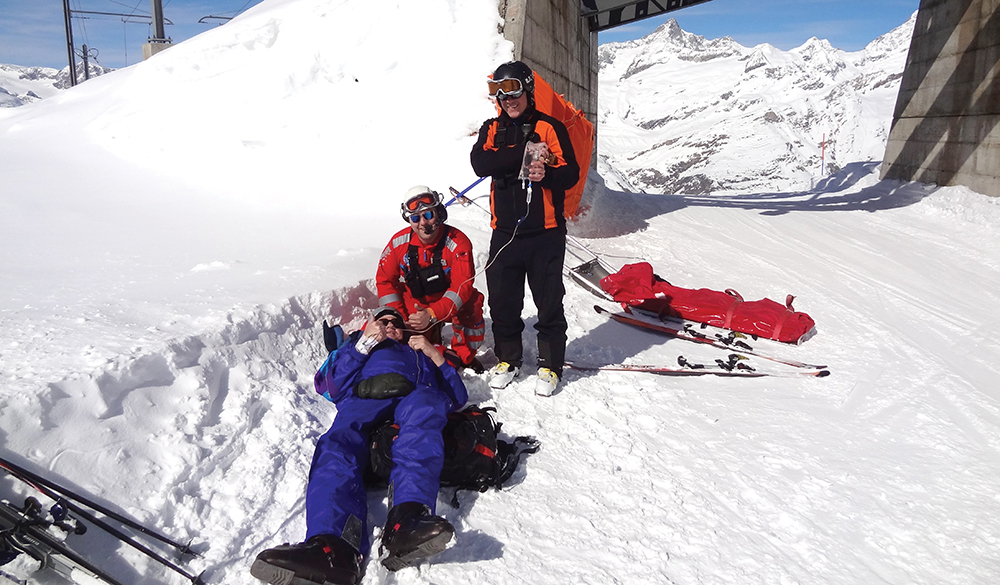 A Global Rescue team performing a rescue on the Matterhorn in Switzerland. Courtesy photo.
A Global Rescue team performing a rescue on the Matterhorn in Switzerland. Courtesy photo.
Political instability, terrorism and viral outbreaks are real concerns for businesspeople who travel abroad. Having a plan in place if something goes wrong is more important than ever. From a helicopter that plucks you off a mountain top to remote medical aid, travel insurance has evolved from just protecting against financial loss for a trip gone wrong to teams of professionals ready to provide lifesaving assistance 24/7.
Global Rescue, headquartered in Lebanon, is an international player in the medical, security, evacuation, travel risk and crisis management arena with more than 1 million members.
CEO Dan Richards founded the company 15 years ago. Since then it’s grown to 250 employees and facilities in Pakistan, Manila, Europe and Ukraine. He moved the headquarters from Boston to Lebanon two years ago, making it the sole U.S. site.

Global Rescue CEO, Dan Richards, in the company’s Lebanon headquarters. Photo by Christine Carignan.
“In the aftermath of 9/11, the global climate changed,” says Richards, adding, in recent years, travelers have become more daring. “In the 80s, people wanted to go to the islands. Today they want to go to Bhutan.”
Richards says Global Rescue works with businesses that operate in remote locations and NGOs, academic and faith-based institutions that have staff and volunteers engaged in humanitarian efforts in conflict zones. “We help them meet their duty of care, which is a legal responsibility to the safety of their staff,” he says.
Global Rescue also provides services to government agencies in Europe, Canada and the U.S. Staff are deployed worldwide from Lebanon, where the local airport has a runway that is almost 5,500 feet long and can accommodate large aircraft.
“About a quarter of the staff are veterans, and other operations staff come from medical fields such as paramedics, nurses and medical technicians,” he says, adding many are currently focused on providing client support related to the coronavirus.
“A lot of people are very concerned; the numbers themselves are very concerning,” says Richards. “This outbreak is unlike any other in recent times. We’re not familiar with how it spreads or what the mortality rate will be.”
The outbreak, which manifests pneumonia-like symptoms, was first traced to Wuhan, China in December. Richards says the company immediately joined the humanitarian response, supplying hospitals in Wuhan with 25,000 pounds of supplies.
At press time in mid-February, more than 2,500 people had died from the virus and more than 75,000 cases had been recorded worldwide. (Editor's note: Interviews for this story, which ran the March issue, were conducted in early February)
There are countries where you would expect to see cases, but none have been reported, says Richards. “There’s a lot of trade and travel between China and Africa. The Chinese have many business interests there; it seems unlikely that there wouldn’t be any cases.”
Richards adds that in areas with a shortage of medical supplies, there aren’t even enough test kits, which could affect the accuracy of reports. “Places where we do have faith in the numbers are the U.S., Japan, the UK and European Union countries.”
Staff at Global Rescue have tracked the virus, compiling data and publishing daily reports with statistics and effects on travel by country, including bans and restrictions.
Insurance Options
Global Rescue is not alone in its field. Other national chains provide medical evacuation, travel risk and other services, including some that operate as an insurance carrier.
Tapping into a crisis management provider isn’t the only way a company can protect its employees when disaster strikes. Businesses can add an endorsement, or rider, to their existing commercial policies to cover expenses related to disasters and emergencies.
Troy Dillow, president of Bernier Insurance in Rochester, says crisis management is a part of most policies now and could address travel and medical expenses stemming from an international emergency. Stateside, crisis management would cover incidents such as an active-shooter event, including the cost of public relations expenses and therapy for affected employees, he says.
“There are three ways [coverage] would typically work, two are after the fact,” Dillow says. Workers’ compensation could cover costs such as those related to an injury incurred during civil unrest, while employment practices liability would cover the costs related to a lawsuit filed by an employee who is sent overseas and becomes ill, such as the virus outbreak in Wuhan, he says.
A third scenario allows a company to access funds immediately to pay for an emergency. “Policies are often manuscripted for the particular risk. Because of the need for it to happen quickly, the company could file a claim and get an immediate determination of whether it will be paid,” Dillow says.
Continued Growth
Richards says there are two macro trends driving travel risk management: individuals are traveling to more adventurous locales, and business travel is still a huge industry. “The supply chain is lengthening. You can get on a plane and be anywhere in 24 hours, and business is driven by human relationships, which to some degree require face-to-face contact,” he says.
Global Rescue recently launched an online platform for mobile devices, allowing clients to see intelligence reports on 250 countries and activate a tracking option. Clients get an alert for events such as the fire at Notre Dame in Paris. “We have the ability to keep track of hundreds of thousands of clients so companies can know where their people are, and we can assist them,” Richards says.
